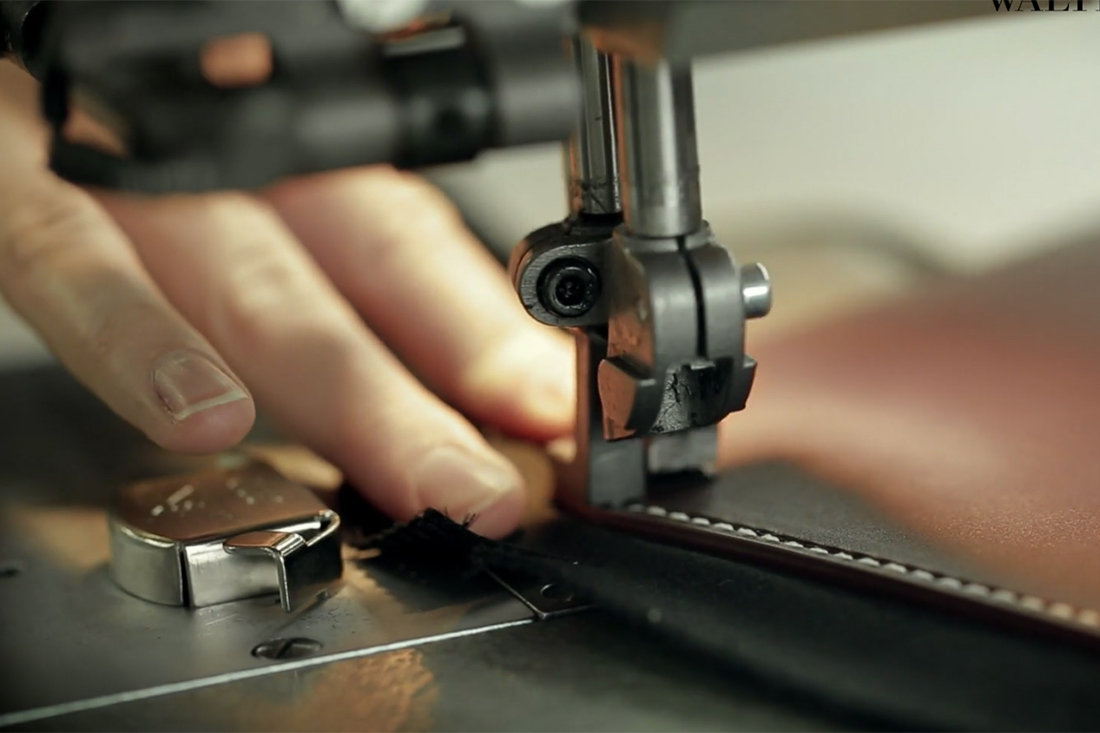What have we done? The worldwide social ramifications of the A+D market have reached tipping point. As Walter Knoll celebrates 150 years in design, they prompt us to consider materiality as a potential solution.

Unfaltering precision. Minute care. Clean lines. Perfect stitching.
Such is the Walter Knoll signature. But it’s not a marketing technique. It’s a socio-economic commitment.
One of the ugliest developments in recent consumer culture is the attitude of rampant disposal. Where consumer demand for trend-focused design is constantly on the up-and-up, the consequential trend for market practice implies an extremely contracted product life-cycle. Currently, the A+D community is all too frequently beholden to an extremely rapid turnaround in ephemeral trend-based design. The result has been frightening. Our rhetoric of sustainability, quality control, design integrity and ethical manufacture, has just become only that: mere rhetoric.
The sheer degree to which much of the market for design has compromised on values and responsibilities we claim to hold dear has become akin to devastating. Each year, our harried scrambling around landfill, recycling or upcycling suffers under our disproportionate rate of disposal. As a result, reckless mass production continues to breed highly unethical manufacturing standards; desperately sad minimal wages; extremely harmful ecological practice; long, laborious working hours and shameworthy conditions; and, once again, a fathomless increase in child labour.
This is a design culture of irresponsibility swept under the carpet of instantly satisfying the latest fads en masse and on the cheap (and cheaper and cheaper again). What can we do? Well, simply, just stop. The only direction we now have left to work back the harm is reorienting ourselves from the ground-up. We have to go back to basics, thoroughly inspect base materials, perfect base processes, invest in manufacture standards and workforces: in short, reconsider the social aspect of what a design culture of uncompromising quality can bring. And then, we have to implement it.
High-end German furnishing house, Walter Knoll, implemented such a programme 150 years ago. It did not err. Understanding that the true value of upholstered furniture is not the pieces themselves but the people behind them, the brand has been able to preserve both quality craftsmanship and the economy and livelihoods which depend upon it.
Walter Knoll’s programme is simple: irrespective of varied constructions, seam patterns must be exacting. Piping must be meticulous. Handiwork must be pinpoint-accurate. Pedigree must be maintained through never compromising: on the finest materials, on the ethically sourced, on the ecologically thoughtful, on the responsibly produced.
Masterly craftsmanship, year after year.
Stitch after stitch.
A searchable and comprehensive guide for specifying leading products and their suppliers
Keep up to date with the latest and greatest from our industry BFF's!

Suitable for applications ranging from schools and retail outlets to computer rooms and X-ray suites, Palettone comes in two varieties and a choice of more than fifty colours.

Marylou Cafaro’s first trendjournal sparked a powerful, decades-long movement in joinery designs and finishes which eventually saw Australian design develop its independence and characteristic style. Now, polytec offers all-new insights into the future of Australian design.

Sub-Zero and Wolf’s prestigious Kitchen Design Contest (KDC) has celebrated the very best in kitchen innovation and aesthetics for three decades now. Recognising premier kitchen design professionals from around the globe, the KDC facilitates innovation, style and functionality that pushes boundaries.

Channelling the enchanting ambience of the Caffè Greco in Rome, Budapest’s historic Gerbeaud, and Grossi Florentino in Melbourne, Ross Didier’s new collection evokes the designer’s affinity for café experience, while delivering refined seating for contemporary hospitality interiors.

Committed to the artful illumination of spaces, Volker Haug Studio amps up its well loved lighting collections with two new additions.

Emerging as if from the depths of the earth, these glistening treasures are the crown jewels of Australian Design & Co. The result of dedicated hard work, the collection of joinery, hooks and other hardware unites thoughtful design with quality materials.
The internet never sleeps! Here's the stuff you might have missed

Milanese artisan Henry Timi celebrates natural materials through strikingly reduced geometric forms, creating a stripped-back vision of interior luxury.

In the pursuit of an uplifting synergy between the inner world and the surrounding environment, internationally acclaimed Interior Architect and Designer Lorena Gaxiola transform the vibration of the auspicious number ‘8’ into mesmerising artistry alongside the Feltex design team, brought to you by GH Commercial.

Overcoming pandemic hurdles to redefine guest experiences amidst Sydney’s bustling entertainment precinct, The Darling has undergone a two-year restoration that melds Art Deco interiors with the necessities of hotel living.